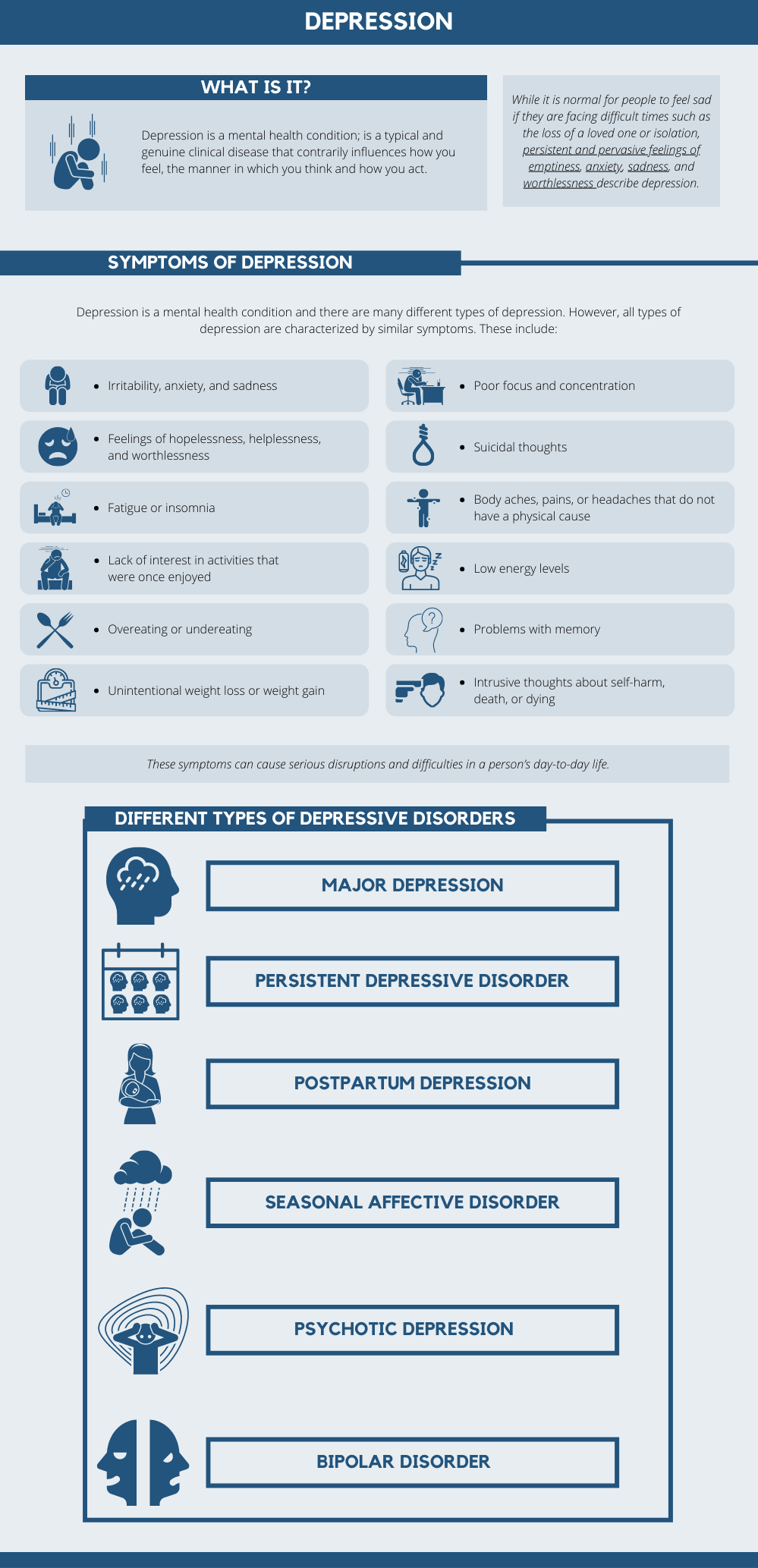Depression is one of the most common mental health conditions in the United States. It is also extremely common among people who abuse drugs and alcohol. Unfortunately, depression can increase the risk of addiction and alcoholism among people who self-medicate their symptoms. And, substance abuse will only make depressive symptoms worse over time. Instead of getting stuck in the cycle of self-medication and hopelessness, treatment centers for depression and addiction in New Jersey can help.
People who struggle with depression and substance abuse can benefit from integrated dual diagnosis treatment that combines mental health therapy with substance abuse treatment. By treating both conditions simultaneously, patients can reap the benefits of both types of treatment in a singular therapeutic setting.

What is Depression?
While it is normal for people to feel sad if they are facing difficult times such as the loss of a loved one or isolation, persistent and pervasive feelings of emptiness, anxiety, sadness, and worthlessness describe depression. Depression is a mental health condition and there are many different types of depression. However, all types of depression are characterized by similar symptoms.[1] These include:
- Irritability, anxiety, and sadness
- Feelings of hopelessness, helplessness, and worthlessness
- Fatigue or insomnia
- Lack of interest in activities that were once enjoyed
- Overeating or undereating
- Unintentional weight loss or weight gain
- Poor focus and concentration
- Suicidal thoughts
- Body aches, pains, or headaches that do not have a physical cause and do not improve with treatment
- Low energy levels
- Problems with memory
- Intrusive thoughts about self-harm, death, or dying
These symptoms can cause serious disruptions and difficulties in a person’s day-to-day life.
The different types of depressive disorders are:
- Major depression
- Persistent depressive disorder
- Postpartum depression
- Seasonal affective disorder
- Psychotic depression
- Bipolar disorder
Depression is usually treated with a combination of antidepressant medications, therapy, and lifestyle changes.
Understanding Depression and Substance Abuse
Depression and substance abuse are extremely common among people who enter behavioral health treatment. Even though these conditions co-occur frequently, they can be difficult to manage.
Some people develop depressive symptoms as a result of ongoing substance abuse. This is because drug and alcohol abuse influence the same neurotransmitters in the brain that are responsible for mood and feelings of wellbeing: dopamine and serotonin. However, other people develop an addiction as a result of self-medicating their depressive symptoms. People who struggle with depressive disorders may go undiagnosed or become impatient with trying medications that always seem to fail. Either of these situations could encourage struggling individuals to try and medicate their symptoms on their own, using drugs or alcohol, and eventually becoming addicted.
Studies have found that nearly half of women and a quarter of men who are addicted to alcohol struggle with depression. Overall, between 50-70% of people who struggle with substance abuse are thought to also struggle with depression at some point in their lives.[2]
Dual Diagnosis Treatment for Depression and Addiction
Multiple studies have found that less than 10% of people who struggle with co-occurring disorders get the help they need.[3] This is unfortunate because proper treatment for depression and addiction that uses an integrative approach is highly effective. Integrated treatment approaches are thought to improve access to care and improve treatment outcomes because both disorders are treated simultaneously.
Patients who think they are struggling with depression should enter an inpatient detox program. Inpatient detox provides intensive medical care as substances leave the body. After detox, the clinical team will observe whether or not their patients’ moods have improved or if they should begin antidepressant medication. In addition to medication, other treatment options involve inpatient hospitalization, outpatient therapy, and behavioral and psychosocial interventions.[3]
Treatment Modalities in New Jersey
Aside from the usual treatment protocol involving group therapy, individual counseling, 12-step facilitation, and relapse prevention, treatment for depression and addiction in New Jersey may consist of the following treatment modalities.
- Cognitive-behavioral therapy (CBT) – CBT focuses on helping patients make connections between their thoughts, activities, behaviors, feelings, and actions. It can help teach patients how to change their thinking and behaviors.
- Antidepressant medications – Most patients with depression will be prescribed an antidepressant to help manage their symptoms. These medications help balance brain chemicals to support a more balanced mood. Antidepressants are most effective when combined with therapy and lifestyle changes.[3] Some of the most widely prescribed medications for depression are SSRIs, including, Fluoxetine (Prozac), Citalopram (Celexa), and Sertraline (Zoloft).
- Family systems therapy – Family involvement can significantly improve treatment outcomes in people struggling with depression and addiction. This therapy helps the family unit recognize their roles, stop unhealthy behaviors, and learn to support one another in a healthy way.
- Motivational Interviewing (MI) – MI is a therapeutic strategy that helps patients find internal sources of motivation to stay sober or live a healthy life. Since finding motivation can be especially difficult for people with depressive disorders, this approach can be highly effective in treating addiction.
- Lifestyle changes and holistic therapies – These may include exercise, meditation, yoga, relaxation techniques, support groups, self-help groups, and more.
All of the above-listed therapies can be individualized to meet a patient’s specific needs. Depression can have devastating effects on a person’s life and well-being, but these evidence-based therapies can help them discover meaning and motivation to live and grow without the use of drugs and alcohol.
Find Treatment for Depression and Addiction in New Jersey Today
People who struggle with depression and substance abuse need specialized treatment if they want to improve their quality of life. Our team of professional addiction specialists can help you or a loved one find quality treatment for depression and addiction in New Jersey and surrounding areas. Every day, members of our team dedicate their time to help individuals just like you begin a new way of life. Call now to get started.
References:
Medically Reviewed: April 26, 2021

All of the information on this page has been reviewed and verified by a certified addiction professional.

